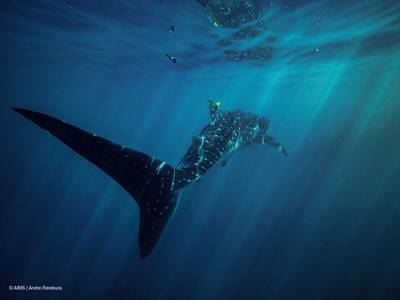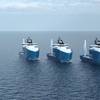Whale Sharks Beware!
An international study has found whale sharks and ships are more likely to collide by the end of the century due to climate change.
The researchers used global climate models and satellite-tracking data of 348 tagged whale sharks from 2005 to 2019 and combined it with shipping traffic models and habitat suitability estimates to predict the risk of interaction.
Whale sharks are highly mobile marine megafauna that can travel hundreds or thousands of kilometers annually. The species are already vulnerable to collisions with ships due to their use of surface water and the high level of habitat overlap with marine traffic.
The study found under a high-emissions scenario, whale sharks could be forced to move into cooler environments, and this would make them 15,000 times more likely to collide with ships.
The study, published in Nature Climate Change, was led by the Marine Biological Association and co-authored by Associate Professor Ana Sequeira and Dr Mark Meekan, from The University of Western Australia’s Oceans Institute, and Dr Luciana Cerqueira Ferreira and Dr Michele Thums from the Australian Institute of Marine Science (AIMS) and adjuncts at UWA’s Oceans Institute.
“Moving to cooler regions may protect whale sharks from climate change, but we found it can also expose them to risks such as fishing exploitation, increased danger from predators and collisions with ships,” Meekan said.
“This study emphasizes the need for quantitative climate-threat predictions in conservation assessments and management of endangered marine megafauna.”
The study concluded whale shark climate-induced migration, and the subsequent hazards, could have population-wide implications.
“Forced climate migration could lead to core habitat loss and reduced foraging opportunities for sharks,” Thums said. “Unexpected ocean conditions may also lead to increased mortality, and reduced breeding opportunities as where mature adults mate or females give birth is not yet known.”
The research was led by the Marine Biological Association, Plymouth, and the University of Southampton and included international and Australian co-authors. Australian co authors came from James Cook University, Biopixel Oceans Foundation, The University of Queensland, Murdoch University, The University of Western Australia, ECOCEAN, University of the Sunshine Coast, Sundive Research, and Australian National University.













